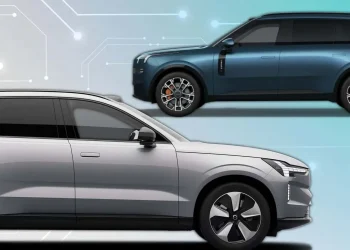The Volvo Extended-Range Electric SUV is set to reshape the company’s US lineup by the end of the decade. Volvo announced plans to build an EREV (Extended-Range Electric Vehicle) tailored for American families, combining the benefits of electric driving with a gasoline-powered generator that removes range anxiety.
What makes Volvo’s EREV unique
CEO Håkan Samuelsson described the upcoming model as the “second generation of hybrids.” Unlike traditional hybrids, an EREV drives entirely on electric motors. The gasoline engine acts only as a generator, recharging the high-voltage battery when needed. Samuelsson emphasized that the SUV will behave like a pure electric car, offering strong acceleration and charging compatibility, while still carrying a built-in backup system.
This approach arrives as sales of fully electric vehicles face challenges in the US. The expiration of a federal tax credit on September 30 adds more uncertainty, pushing automakers like Volvo, Ford, Hyundai, Nissan, and Scout Motors to explore extended-range solutions.
Targeting the American market
Volvo confirmed that production will take place at its Ridgeville plant in South Carolina, reflecting the focus on the US market. The model will be developed across several countries, though most of the engineering will happen in Sweden. Executives noted the design will prioritize American families, highlighting demand for larger SUVs with longer driving ranges.
The Volvo Extended-Range Electric SUV could build on the XC90 platform or a similar crossover. Erik Severinson, Volvo’s Chief Commercial Officer, pointed to the importance of this size and segment, saying it remains a strong market for plug-in and extended-range vehicles.
Volvo’s portfolio and global context
Volvo’s parent company, Geely, has already tested the waters with EREV technology through its Lynk & Co. brand. Lynk & Co. offers a large SUV with a 52.4 kWh battery and 845 horsepower, capable of more than 1,600 km on China’s test cycle. While Volvo has not released range estimates for the US model, expectations remain high given the company’s strong hybrid and EV expertise.
The EREV announcement comes alongside a series of updates from Volvo. These include an upgraded EX90 electric SUV and the start of XC60 gasoline production at Ridgeville. Volvo also recently unveiled the XC70 plug-in hybrid in China, offering a 200 km all-electric range. However, executives made clear that the new US-bound EREV will be different and central to Volvo’s long-term portfolio.
Outlook for the extended-range SUV
By focusing on extended-range technology, Volvo hopes to attract buyers still hesitant about switching to full EVs. With a design centered on American families, a reliable backup system, and production set in the US, the Volvo Extended-Range Electric SUV could play a pivotal role in the brand’s future strategy.











